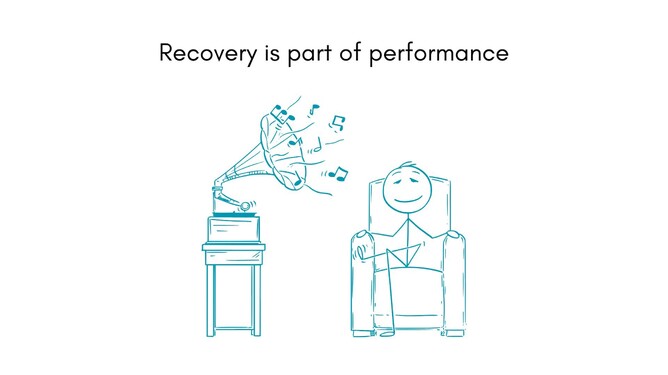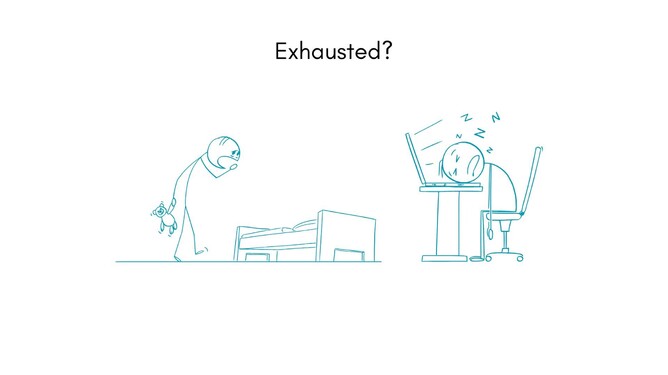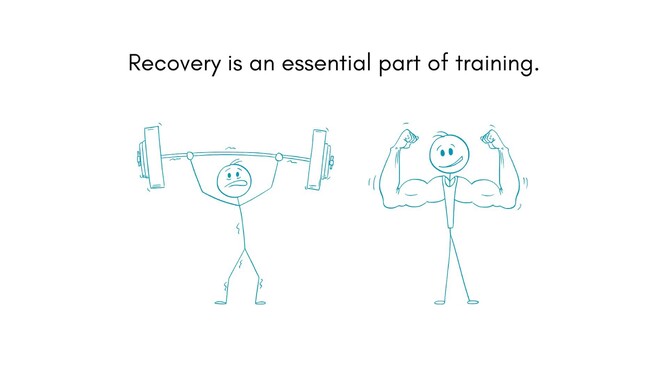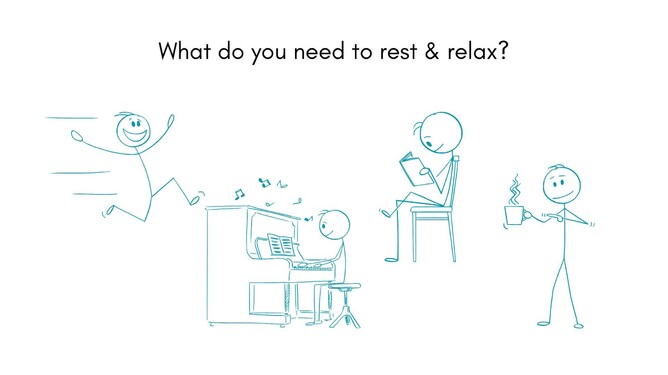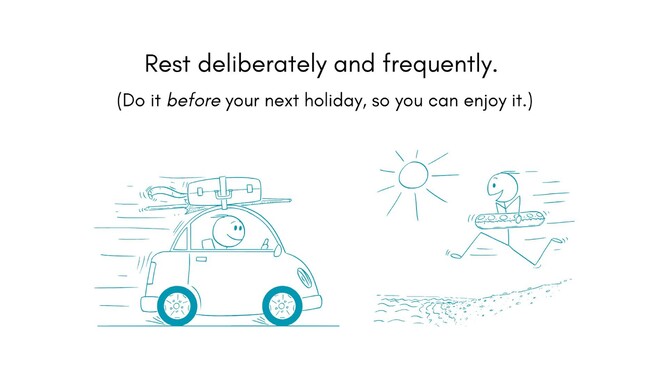You’ve worked through your work projects, assignments, chores at home, and maybe your exercise or creative routine. Maybe you’ve also been looking after other people in your household or keeping the house organised, the fridge full, and the bathroom tidy. Maybe alongside all that, you have tried to start a side hustle or to push your side hustle further. And, unsurprisingly, you are exhausted.
So, you think you’ll need some rest. Maybe some sleep will help. Or just some time to chill out, switch off.
You probably do.
Many of us have the slightly unhelpful idea that resting means taking a holiday, that to rest properly, you need to take time off from what you normally do. Part of the problem is that we rest too little and too late. When I support clients and athletes, this is often a point of discussion. How are you resting? When are you deciding to take a break, and what are you doing during that ‘break’?
The tendency is to rest only when we are absolutely exhausted. Many push themselves until they can’t go on any longer. And then you need a whole weekend or a whole week to recover. You might get to your next bit of leave, time off, or your next holiday, and you get sick within the first few days, because you have held on too long. Don’t get me wrong, the reasons for this are complex, and I don’t propose that this blog post will solve everything, but it might help you think about rest and recovery differently. A bit more deliberately.
The athletes I work with usually have a training plan. The training sessions are scheduled for them, and coaches will think of the content for each session. There will be a system behind this because coaches will likely have thought about what skills and abilities they need to build first, what comes next, and so on.
So far, so obvious.
The training plan will also have blank spaces. It will have room between training sessions. Depending on the athlete and the sport, athletes will know the exact times of their training sessions each day. If they don’t, they might have a daily outline of what to do, but they get to choose when they complete the session(s). In both cases, there will be gaps. There will be times when they are not training.
It is this time we need to pay attention to.
Athletes need to schedule other things, too: study, work, looking after their kids, meetings with their team(s), and other general life appointments. Depending on the sport, they may also need to allocate more time than the average person to eat… IYKYK.
Once all those things have been added to the weekly schedule, we have a better idea of how much time people actually have to rest and recover. It might only be a few minutes a day. It might not amount to much across the week, but what is important is that you know how much time you actually have to rest.
If you don’t know when you will have time to pause, rest, and recover, you’ll likely miss the opportunity.
The best analogy I have found so far is going to work out at the gym. While you are at the gym, you tire yourself out, you do exercises that work your muscles. The adaptation, the bit that will make you stronger, happens after the session, while you are resting. When you rest, your muscle fibres repair and grow. This doesn’t happen during the gym session, while lifting weights. This happens while you sleep & when you rest. To me, this is the most obvious example of ‘recovery is part of training’ - because the muscle literally grows and repairs while you are taking a break from using it.
You need both.
Think of your other tasks and pursuits in similar ways. If you have to complete an assignment, start. Make yourself familiar with what you have to do, and then work on it for a bit. Take a break. Your brain will keep working on the task while you rest. Next time you put your mind to the same task, you start from a different level, already with a better understanding. The same is true for creative work. Start with something, chip away at it, even if the idea is not quite what you want it to be yet. Then rest. Give your body and brain time to recover in between rather than attempting to do it all in one go. The rest time in between gives you a chance to rest, reflect and process. We need rest to show up in the best possible way and to do our best work.
How to rest? Well… what do you need to be fully recovered? What is the best way for you to recharge? When we have a minute to take a break, many of us end up sitting down, scrolling mindlessly on phones or watching series. While this might work well some of the time, I wonder what other ways of recovering might work for you. Many of the people I work with are highly active. Sitting on the couch actually doesn’t work for them for very long. They feel more recovered when they have been for an easy stroll around the block, a low-intensity bike ride, when they’ve been out for a coffee with friends or when they’ve done something creative.
The challenge is to figure out what works best for you. Not anyone else. But you. And then to make time for that thing to allow you to rest and recover.
If you need a nap, make time for a nap. If you need to read, make time to read. If you need to talk to friends, let them know and make time to talk to them. If you need to go for a run, get your gear ready and make time for a run. Rest and recovery are counterintuitive sometimes. Many people spend hours each day sitting. We are exhausted at the end, but physically, we have not been challenged at all. So, to go home and sit some more won’t help, even though the couch might be more comfortable.
Movement may be what you actually need to relax, recover, and rest. It might offer your brain the pause it needs and will tire you out enough that you can sleep.
Have mini breaks. Create little periods to ensure you are rested and refreshed. Recovery doesn’t necessarily have to be long if you are prepared to make time for it and plan it deliberately. It can be a five-minute dance to your favourite song, it could be a phone call with a friend, or it could be a walk around the block. Little breaks more often might be much more useful to help you feel energised. And take breaks early and frequently. Recharge when you notice that you are struggling to concentrate, rest deliberately when you notice you get tired more quickly, when you find yourself switching off in conversations, or when you find you can’t quite listen well enough.
Find the activities that give you energy. Maybe for you, that is a jigsaw puzzle or knitting, maybe it's a run or a bike ride, maybe it's a chat with a friend. There is no right or wrong. No one else will be able to tell you exactly what is best for you, though. You’ll need to take some time to reflect and try a few things. Maybe you need to go to an art gallery to get some creative inspiration. Maybe you need to jump into the sea.
I don’t know what it is for you. But I’d recommend you find out. Because recovery is part of any kind of performance in life. It influences how you show up as a friend, partner, colleague, family member, etc., and it influences the quality of your work.
Reflect :)
And rest.
That's the blog for another week. Please feel free to share it if you know someone who might find this useful. And, as always, I'm keen to hear from you. Send me a message on Instagram @mankertina. Till next time...
Key points:
Recovery is an essential part of performance - any performance.
We often don’t use the time we have to recover as effectively as we could.
We often rest too late.
Reflection questions:
What activities help you rest and recover?
When can you take mini rest breaks in your schedule? What can you do during those times to switch off and rest?
How can you hold yourself accountable to actually rest?
